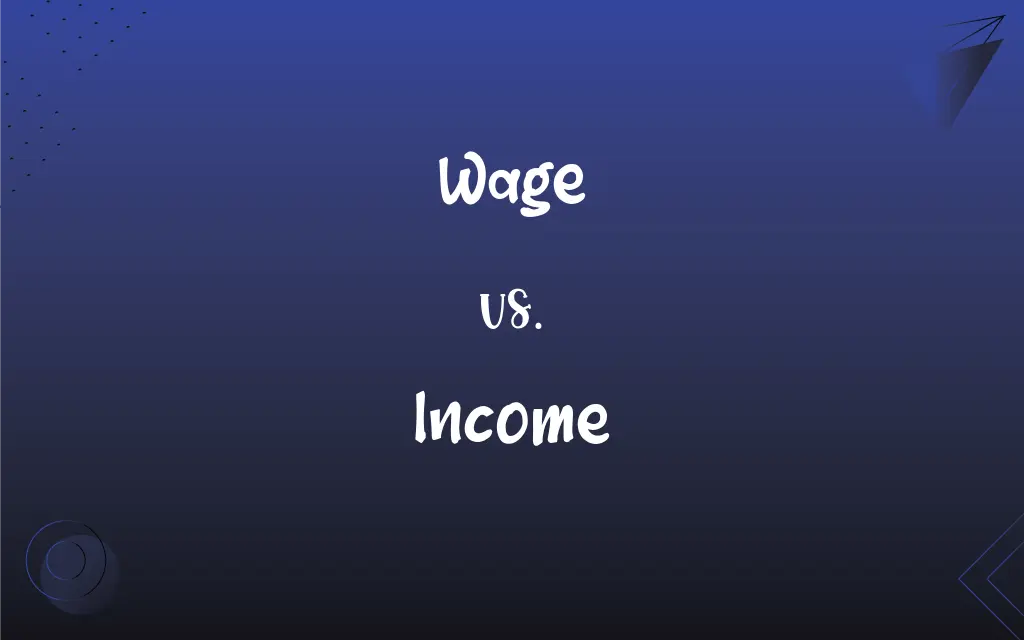Wage vs. Income: What's the Difference?
Edited by Harlon Moss || By Aimie Carlson || Published on November 11, 2023
Wage is payment for labor or services per unit of time, while income includes all earnings, like wages, investments, and benefits.

Key Differences
Wage is a specific term referring to compensation received for labor or services, usually calculated on an hourly, daily, or piecework basis. Income encompasses the broader concept of money received, typically over a period of time, and can include wages, salaries, bonuses, and earnings from investments.
Income represents the total financial gain from employment and other sources, such as investments or rental property, whereas wage is specifically the payment employees receive from working. Income can be consistent or varied, while wages are often regular and predictable payments.
Wages are earned from one's job or employment, directly correlating with the amount of time worked or tasks completed. In contrast, income includes all sorts of financial inflows, like dividends from stocks, which are not tied to active labor or time spent working.
Earning a wage is a form of income, but not all income is from wages; for example, a retiree might have an income from a pension without receiving a wage. The distinction is important for financial, legal, and taxation purposes, as different forms of income are taxed differently.
Wages are often subject to minimum wage laws and are a crucial part of discussions about labor rights and standards. Income, on the other hand, may include passive earnings and is the broader measure used to assess wealth and economic status.
ADVERTISEMENT
Comparison Chart
Definition
Payment for labor per unit of time
All earnings from various sources
Types
Hourly wage, salary, piecework
Wages, salaries, dividends, rent
Calculation
Based on hours worked or tasks completed
Sum of all monetary gains
Source
Employment or labor
Employment, investments, other sources
Tax Consideration
Often subject to payroll taxes
Includes various tax considerations
ADVERTISEMENT
Wage and Income Definitions
Wage
A fixed regular payment, typically paid on a daily or weekly basis, made by an employer to an employee.
He received his weekly wage every Friday.
Income
The sum of all the wages, salaries, profits, interest payments, rents, and other forms of earnings received.
His income puts him in the top tax bracket.
Wage
Earnings paid to a worker based on the number of hours or days worked.
For overtime, her wage was time and a half.
Income
The financial gain received by an individual or a household, encompassing various sources.
His annual income includes his salary plus earnings from his rental properties.
Wage
A salary or payment, often related to manual or skilled labor jobs.
As a carpenter, his wage was dependent on the contracts he secured.
Income
The total amount of money earned or received by a person or group, typically over a year.
The household's income increased after both spouses got promotions.
Wage
Payment to a worker for services rendered, often expressed hourly.
Her wage of $15 per hour was raised to $18 after a year.
Income
A flow of cash or cash-equivalents received from work (wage or salary), capital, or land.
With a steady job and wise investments, she enjoyed a comfortable income.
Wage
The monetary compensation paid by an employer to an employee in exchange for work done.
The company cut wages by 10% during the economic downturn.
Income
The amount of money or its equivalent received during a period of time in exchange for labor or services, from the sale of goods or property, or as profit from financial investments.
Wage
A regular payment, usually on an hourly, daily, or weekly basis, made by an employer to an employee, especially for manual or unskilled work.
Income
The act of coming in; entrance.
Wage
Wages The price of labor in an economy.
Income
Money one earns by working or by capitalising on the work of others.
Wage
Often wages (used with a sing. or pl. verb) A fitting return; a recompense
The wages of sin.
Income
Money coming in to a fund, account, or policy.
Income
(obsolete) A coming in; arrival; entrance; introduction.
Income
A newcomer or arrival; an incomer.
Income
(obsolete) An entrance-fee.
Income
(archaic) A coming in as by influx or inspiration, hence, an inspired quality or characteristic, as courage or zeal; an inflowing principle.
Income
A disease or ailment without known or apparent cause, as distinguished from one induced by accident or contagion; an oncome.
Income
That which is taken into the body as food; the ingesta; sometimes restricted to the nutritive, or digestible, portion of the food.
Income
A coming in; entrance; admittance; ingress; infusion.
More abundant incomes of light and strength from God.
At mine income I louted low.
Income
That which is caused to enter; inspiration; influence; hence, courage or zeal imparted.
I would then make in and steepMy income in their blood.
Income
That gain which proceeds from labor, business, property, or capital of any kind, as the produce of a farm, the rent of houses, the proceeds of professional business, the profits of commerce or of occupation, or the interest of money or stock in funds, etc.; revenue; receipts; salary; especially, the annual receipts of a private person, or a corporation, from property; as, a large income.
No fields affordSo large an income to the village lord.
Income
That which is taken into the body as food; the ingesta; - sometimes restricted to the nutritive, or digestible, portion of the food. See Food. Opposed to output.
Income
The financial gain (earned or unearned) accruing over a given period of time
Income
Money that an individual or business receives in exchange for providing a good or service or through investing capital.
Her income from her investments supplemented her retirement fund.
FAQs
Can income include gifts?
Yes, income can include gifts, though they may be subject to different tax rules.
Is salary the same as wage?
Salary is a fixed annual amount, often paid monthly, while wage is usually based on hours worked.
Are wages considered earned income?
Yes, wages are a form of earned income from employment.
Do wages include overtime pay?
Yes, wages include regular pay and any overtime pay earned.
What is minimum wage?
Minimum wage is the lowest legal wage that can be paid to workers.
Can loans be considered income?
Loans are not income since they have to be repaid; however, any forgiven part of a loan may be considered income.
What is a wage?
Wage is the payment workers receive from employers, typically based on hours worked.
What is income?
Income is the total money received from various sources, including wages, investments, and other earnings.
Is investment income the same as wage?
No, investment income is earned from investments, while wages are earned from employment.
How do wages affect income?
Wages contribute to total income as one of its components.
Is rent considered income?
Yes, rent is considered income when it is received by a landlord from a tenant.
Are wages always paid in money?
Wages are typically paid in money, but sometimes can be compensated in other forms, such as with goods.
Can tips be considered a wage?
Tips are considered part of wages in many service jobs.
Is a bonus a wage or income?
A bonus is considered part of your income and may be part of your wage if it's related to your employment.
What is passive income?
Passive income is money earned with little to no active effort, like rental income or dividends.
How are wages taxed compared to other income?
Wages are subject to income tax and often payroll taxes, while other income types may have different tax rules.
Are dividends counted as income?
Yes, dividends from stocks are a form of income.
Is Social Security income?
Yes, Social Security benefits are considered income.
Do all workers receive a wage?
Most workers receive a wage, but independent contractors and freelancers may earn income differently.
Does income only come from working?
No, income can also come from non-working sources like investments or inheritance.
About Author
Written by
Aimie CarlsonAimie Carlson, holding a master's degree in English literature, is a fervent English language enthusiast. She lends her writing talents to Difference Wiki, a prominent website that specializes in comparisons, offering readers insightful analyses that both captivate and inform.
Edited by
Harlon MossHarlon is a seasoned quality moderator and accomplished content writer for Difference Wiki. An alumnus of the prestigious University of California, he earned his degree in Computer Science. Leveraging his academic background, Harlon brings a meticulous and informed perspective to his work, ensuring content accuracy and excellence.

































































